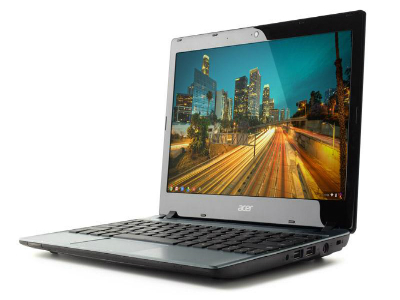Asus Entering Chromebook Market in Q4 2013
Thanks to lackluster notebook sales, Asus may enter the Chromebook market for additional revenue.
Unnamed sources in the upstream supply chain claim that Asus plans to enter the Chromebook market as soon as 4Q 2013 in hopes that high demand in the IT market will boost notebook shipments. More specifically, Asus wants to capture a portion of the education market share where Acer's own Chromebook solutions seem to be thriving.
The news arrives after Asus reportedly reduced its notebook shipment forecast for 2013 to 17 – 19 million units, down from the 22 - 24 million the company originally predicted, after seeing poor back-to-school demand in the third quarter. The company is now looking to the IT market while also focusing on models without touch in the mainstream and entry-level markets. Asus will release a new entry-level Vivobook to defend its touch-based notebook business, sources said.
Asus will also reportedly join Microsoft and Intel on September 15 to reveal the latest convertible products using Windows 8.1 that will be launched on October 18 alongside the update to Windows 8 and Windows RT. This would be five days after Apple supposedly reveals its iPhone 5S and iPhone 5C, and after Sony and Samsung reveal their new flagship products during their pre-IFA events on September 4. Needless to say, September will be a very busy month.
Sources said Asus was originally hesitant about joining the Chromebook crew due to their slow demand, but the slump in Asus laptop sales has prompted the company to investigate additional ways to beef up laptop-based revenue. That means using an operating system with no licensing fees, namely Chrome OS and even Android.
Previous reports spread out throughout the year have indicated that a huge wave of desktops and laptops sporting Android are about to splash into the mainstream market. Unlike Windows 8-based PCs, these would be cheaper because Google doesn't charge a licensing fee to OEMs. The platform is also extremely popular as seen with the current army of smartphones and tablets.
Android 5.0 "Key Lime Pie" is reportedly the OS of choice for laptops and desktops, as it will supposedly cater to the full-scale desktop environment much like Chrome OS. Google currently insists that both will always remain separate, but sources claim that the two platforms could be integrated in 2014, hence Asus' decision to use Google's platforms. However, Chrome OS and Android take completely different approaches to software: Chrome OS via Internet-heavy HTML5-based "packaged" apps and Android via locally-installed apps.
Chromebooks are reportedly still suffering from weak demand, as combined shipments in the first half of 2013 were much lower than expected. Android-based laptops could possibly serve the mainstream consumer better due to its connection with current tablets and smartphones. Asus reportedly also sees its use of Android and Chrome OS as a means to tighten its relationship even further with Google.
Get Tom's Hardware's best news and in-depth reviews, straight to your inbox.

Kevin Parrish has over a decade of experience as a writer, editor, and product tester. His work focused on computer hardware, networking equipment, smartphones, tablets, gaming consoles, and other internet-connected devices. His work has appeared in Tom's Hardware, Tom's Guide, Maximum PC, Digital Trends, Android Authority, How-To Geek, Lifewire, and others.
-
g00fysmiley asus makes some interesting things, hope they do up a chromebook that is like most of their stuff a convertable between book format and tablet formatReply -
schultzter I never understood why Google keeps dragging Chrome OS along. I mean, I guess once something has momentum you can't easily pull-out of it. But really they need a plan to merge Android and Chrome OS (keep the Chrome browser) into one - probably Android - operating system.Reply
Even prior to Android 5 there was a strong case of Android laptops. Look at any tablet with a keyboard, especially something like the hugely successful Transformer series. They're basically Android netbooks! -
Schwermzilla I think as Chrome OS and Android get closer and closer we will eventually see dual booting devices, Owners could choose between an instant on, fast, lightweight web browser. Or boot into their home screens on android in less than a minute.Reply -
brian_st "Chrome OS via Internet-heavy HTML5-based "packaged" apps and Android via locally-installed apps."Reply
Chrome Packaged Apps are also locally-installed. Indeed a primary tenant of Chrome Packaged Apps is that they be able to work offline. Another important feature is that when you exit a Chrome Packaged App on one device and open it on another, you will be working right where you left off. I'm not sure what "Internet heavy" means, we are after all in a world where stodgy Microsoft Office is "cloud" enabled.
The big difference between the Chrome and Android approaches is that Android apps are written in Java and C and work only on Android. Chrome is very cross-platform and uses Javascript and C. The cross-platform nature of Chrome Package Apps means there is a more limited selection of underlying platform facilities available. Chrome Packaged Apps will run under Android later this year. Apps that do device specific settings or implement lock-screen widgets or do other such platform specific things have to be written for Android natively. Google also seems to be recommending that heavy duty games be written for Android natively.
-
brian_st "Chromebooks are reportedly still suffering from weak demand, as combined shipments in the first half of 2013 were much lower than expected." Nothing could be further from the truth... Chromebooks is one of the few areas of PC's that are growing. The rumor you're passing on above came originally from DigiTimes... not exactly a reliable source.Reply
http://computingcompendium.blogspot.com/2013/07/at-last-real-chromeos-number-and-theyre.html
